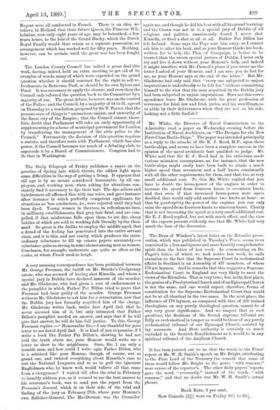A very amusing correspondence has been published between Mr. George
Freeman, the bailiff on Mr. Brooke's Coolgreany estate, who was accused of having shot Kinsella, and whom a special jury in Dublin have declared innocent of the murder, and Mr. Gladstone, who had given a sort of endorsement to the pamphlet in which Father Pat Dillon tried to prove that Freeman had been guilty of the murder. George Freeman writes to Mr. Gladstone to ask him for a retractation, now that the Dublin jury has formally acquitted him of the charge. Mr. Gladstone writes back, under date April 2nd, that he never accused him of it, but only intimated that Father Dillon's pamphlet needed an answer, and says that if he will give that answer, he will do him full justice. To this, George Freeman replies :—" Honourable Sir,—I am thankful for your letter to me dated April 2nd. It is kind of you to promise, if I write a book like Father Pat Dillon's, showing he had not told the truth about me, your Honour would write me a letter to show to the neighbours. Sure, Sir, I am only a humble man, and how could I write agin Father Dillon, who is a scholard like your Honour, though, of course, not so grand one, and twisted everything about Kinsella's case to suit the National Leaguers, and so as to gull the ignorant Englishmen who, he knew well, would believe all that came from a clergyman P I waited till after the trial in February to humbly address you, as it seemed to me the best answer to his reverence's book, was to send you the report from the Freeman's Tcrurnal, which is on their side, of the trial and finding of the jury on February 27th, where your Honour's own Solicitor-General, The MacDermot, was the Councilor again me, and though he did his best with all his grand learning. and the Crown was not in it, a special jury of Dublin of all religions and politics, unanimously found I never shot Kinsella, or fired a shot at all at all. Father Pat Dillon has left Ireland. Some says the Pope sent him away, so I cannot ask him to alter his book, and as your Honour thinks his book, written for to help the Plan of Campaign, is better to be trusted than the sworn special juriors of Dublin, I must only try and live it down without your Honour's help, and indeed it might interfere with Mr. Parnell's plans if you wrote me the letter I asked of your Honour, and I am sure you do feel for me, as your Honour says at the end of the letter." But Mr. Gladstone had only said that "every one subjected to unjust imputations is undoubtedly to be felt for," without committing himself to the view that the man acquitted by the Dublin jury had been subjected to unjust imputations. Does not this corre- spondence leave Mr. Gladstone, with his great profession of reverence for Irish law and Irish juries, and his unwillingness to abide by their deliverances when they are not on his side. looking not a little foolish P


































 Previous page
Previous page